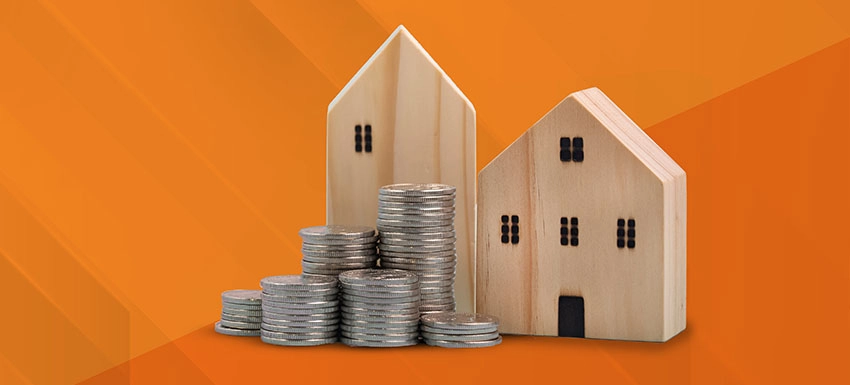THE
ORANGE
HUB
Pre-EMI vs Full EMI Repayment for Home Loan

Buying a home is a significant financial decision for most people in India. It often involves availing a Home Loan to fulfil the dream of owning a home. When you apply for a Home Loan, you will come across various repayment options such as Pre-EMI repayment and Full EMI repayment. But which one is better for you? This guide will compare the two repayment methods to help you make an informed decision that suits your financial circumstances and goals.
Understanding Pre-EMI repayment and Full EMI repayment
Before we compare the two, let us understand what Pre-EMI and Full EMI repayments mean:
Pre-EMI repayment
Pre-EMI is a repayment option available to Home Loan borrowers during the under-construction phase of a property. In this method, you pay only the interest component of the Home Loan amount disbursed by the bank. The principal repayment begins once the construction is complete and the property is ready for possession. Pre-EMI payments are usually lower than Full EMI payments because you are not repaying the principal amount.
Full EMI repayment
Full EMI, as the name suggests, involves paying the Home Loan's interest and principal components right from the start. This repayment method is for properties that are ready for possession and you start repaying the entire loan amount as soon as the loan is disbursed. The EMI amount remains constant throughout the loan tenure.
Comparing Pre-EMI repayment and Full EMI repayment
Now that we have an understanding of the basics, let us compare these two repayment methods across various aspects.
Initial EMI amount
Pre-EMI: The initial EMI amount is lower as compared to the Full EMI because it covers only the interest component of the loan.
Full EMI: The initial EMI amount is higher since it includes both interest and principal repayments.
2. Total interest payment:
Pre-EMI: In the long run, Pre-EMI can be costlier because you are not making any principal repayments during the initial phase. This means you are paying interest on the entire loan amount for a more extended period.
Full EMI: With Full EMI, you start repaying the principal right away. This reduces the overall interest burden, making it more cost-effective in the end.
3. Loan tenure:
Pre-EMI: The loan tenure is longer because you start repaying the principal later. This might result in a more extended loan repayment period.
Full EMI: The loan tenure is relatively shorter because you begin repaying both interest and principal immediately.
4. Cash flow:
Pre-EMI: It offers better short-term cash flow as the initial EMI is lower. This can be beneficial for borrowers who need to manage their finances during the early stages of the property's construction.
Full EMI: Full EMI might exert more pressure on your cash flow initially due to the higher EMI payments. However, it helps in quicker principal repayment.
5. Total cost of the property:
Pre-EMI: The total cost of the property might be higher due to the longer loan tenure and higher overall interest payments.
Full EMI: It can result in lower total cost of the property because of quicker principal repayment and lower interest payments.
6. Tax benefits:
Pre-EMI: You can claim tax benefits on the interest component of the Pre-EMI payments under Section 24(b) of the Income Tax Act. However, you will not get any tax benefits on the principal repayment during the construction phase.
Full EMI: You can claim tax benefits on both the interest and the principal components of Full EMI payments, making it more tax-efficient.
7. Risk factors:
Pre-EMI: There is a risk that the project's construction may get delayed, extending the Pre-EMI payment period and increasing the overall costs.
Full EMI: Since you start repaying both the interest and principal immediately, you are less exposed to construction delays and associated risks.
Which repayment option is better for you?
The choice between Pre-EMI vs Full EMI repayment depends on your financial situation, risk tolerance and objectives. Here are some scenarios in which one option might be more suitable than the other:
Choose Pre-EMI if:
You need to manage your cash flow effectively during construction, ensuring that your financial stability is maintained. You are comfortable with a longer loan tenure and are willing to pay slightly higher interest costs in the long run to ease your immediate financial burden. You are confident that the project's construction will be completed within the estimated timeframe, reducing the risk of extended Pre-EMI payments.
Choose Full EMI If:
You want to minimise the overall interest cost and shorten the loan tenure, aiming for quicker loan repayment and reduced interest payments. You can comfortably manage higher EMI payments from the beginning without straining your financial resources. You prefer a shorter loan tenure, allowing you to become debt-free sooner and have greater financial flexibility.
Both Pre-EMI and Full EMI repayment methods have their pros and cons. Your choice should align with your financial goals and cash flow requirements. It is essential to assess your financial situation carefully and consult with your lender or financial advisor before making a decision. Keep in mind that your choice can impact your overall Home Loan experience and the total cost of your property purchase.
There is no one-size-fits-all answer to whether Pre-EMI or Full EMI is better. Your decision should be based on your circumstances and priorities. Regardless of your choice, use a reliable Home Loan EMI Calculator to understand the financial implications and plan your repayment strategy accordingly.
Scroll to top











